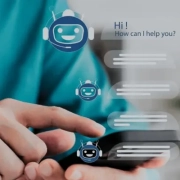How AI and NLP Are Revolutionizing Clinical Decision-Making
Key Takeaways:
- AI and NLP are the new GPS for healthcare. They help clinicians navigate massive amounts of data, cut through the fog, and find the fastest route to better patient outcomes.
- Think of clinical notes as a gold mine. NLP digs deep into unstructured data, like physician dictations and lab reports, and pulls out insights that power smarter decisions.
- Healthcare’s “decision bottleneck” is like rush-hour traffic. AI clears the lanes with predictive models, faster diagnostics, and personalized treatment recommendations.
Healthcare today is more complex than ever. Rising costs, endless streams of patient data, clinician burnout, and the need to meet strict regulatory standards have created a perfect storm for HealthTech leaders. At the center of it all lies clinical decision-making, the heartbeat of healthcare delivery. Whether it’s diagnosing conditions, prescribing treatments, or monitoring outcomes, the quality of these decisions directly impacts patient lives.
But here’s the challenge: traditional systems struggle to keep pace with the sheer volume of unstructured medical data, fragmented records, and delayed diagnostics. That’s where artificial intelligence (AI) and natural language processing (NLP) step in, not just as helpful tools, but as transformative forces reshaping how clinicians and healthcare organizations operate.
By harnessing medical artificial intelligence and healthcare analytics, providers can turn messy data into meaningful insights, reduce errors, and speed up decision-making. Imagine AI as a co-pilot for doctors, scanning millions of medical records, research papers, and lab results in seconds, surfacing patterns that humans might miss. NLP in medicine adds another layer, making sense of physician notes, patient histories, and even voice data to improve accuracy and efficiency.
For HealthTech leaders, the pressure is clear: improve patient outcomes, cut costs, and modernize digital health ecosystems. Clinical Artificial Intelligence and AI & ML services now present a strategic path forward to unlock smarter, faster, and more precise healthcare decisions.
The State of Clinical Decision-Making Today
Clinical decision-making has always been the backbone of healthcare. Yet, in today’s environment, it often feels like doctors and care teams are fighting an uphill battle. Despite advancements in digital health, many systems still lean heavily on manual expertise and outdated processes.
Most healthcare organizations are dealing with:
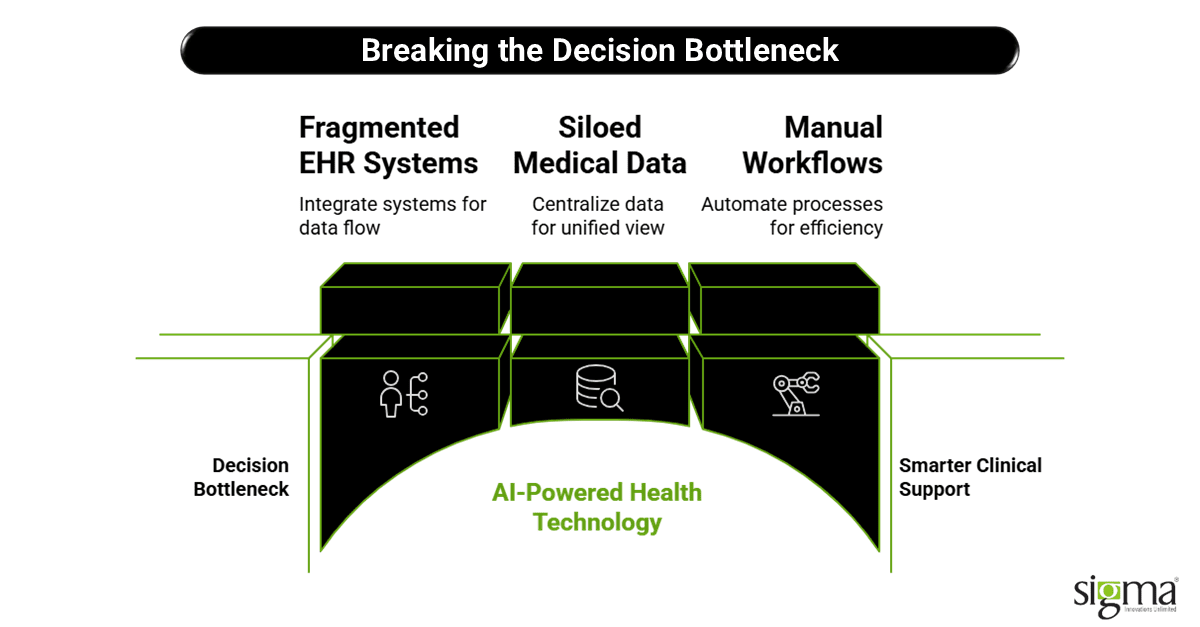
- Fragmented EHR systems that don’t talk to each other.
- Siloed medical data spread across labs, imaging systems, and patient notes.
- Manual workflows that slow down the entire care process.
These gaps create several real-world challenges:
- Delayed diagnostics: Time is lost piecing together scattered information, delaying treatments.
- Inconsistent documentation: Errors creep in when data isn’t standardized across systems.
- Data overload: Clinicians face more information than they can realistically process.
- Clinician fatigue: The burden of managing complex data adds to burnout.
The result is what many call the “decision bottleneck” in healthcare. Providers have the knowledge and intent to deliver better outcomes, but the tools at their disposal often work against them. When critical decisions are delayed or based on incomplete information, patient care suffers.
This is exactly where health technology and healthcare analytics powered by medical artificial intelligence can make the biggest impact; breaking through the bottleneck and enabling smarter, faster, and more reliable clinical decision support.
Why AI and NLP Are a Game-Changer in HealthTech
When it comes to healthcare, data isn’t the problem, making sense of it is. Hospitals, clinics, and research centers generate mountains of data every day, but much of it is messy, scattered, and difficult to use in real time. This is where artificial intelligence (AI) and natural language processing (NLP) are changing the game for clinical decision support.
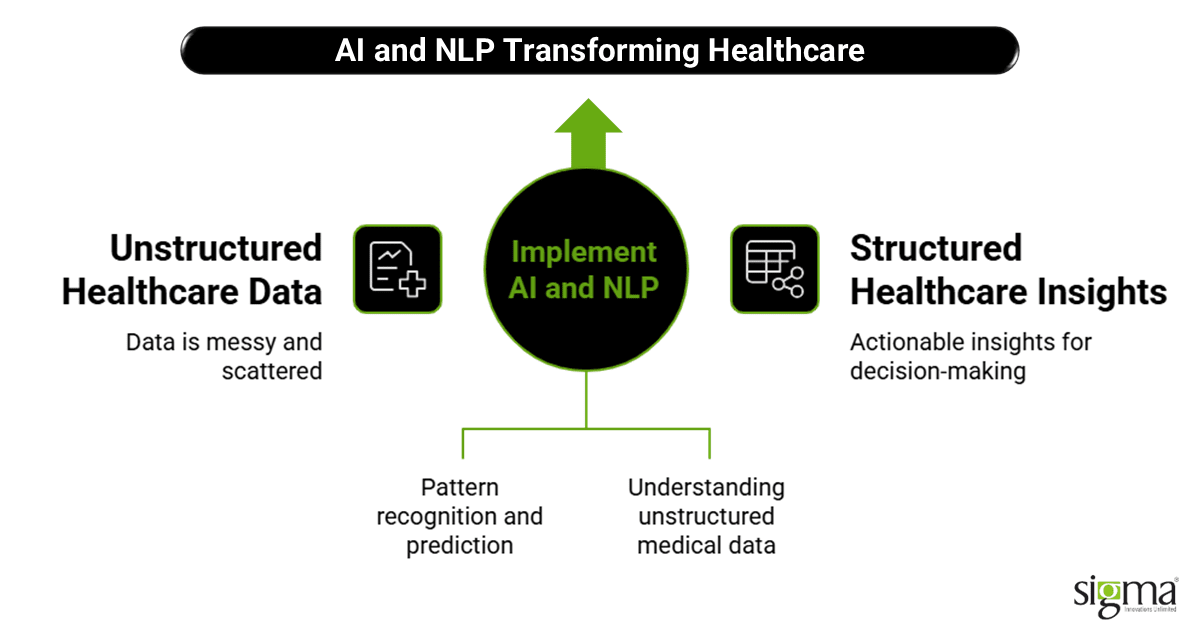
At a high level, the two work hand in hand but serve different roles:
- AI specializes in pattern recognition and prediction. It analyzes structured data like lab results, medical images, or patient vitals to identify risks and suggest next steps.
- NLP focuses on understanding unstructured medical data like physician notes, imaging reports, patient feedback, research studies, even call transcripts.
Here’s the reality: over 80% of healthcare data is unstructured. That means the most valuable insights often live outside of traditional databases, locked inside long clinical notes, dictated reports, or thousands of research papers. Without advanced tools, clinicians simply don’t have the time to process it all.
NLP bridges this gap by transforming text-heavy information into structured, searchable, and actionable insights. For example, physician dictations can be instantly converted into structured records, surfacing symptoms, treatments, or medication patterns that support real-time clinical decision-making.
The result? A powerful combination of medical artificial intelligence and NLP in medicine that brings clarity to chaos. With AI predicting outcomes and NLP unlocking hidden insights, healthcare leaders can move from reactive care to proactive, precision-driven decision-making.
For HealthTech organizations, adopting AI & ML services in the USA is no longer just about keeping up with digital transformation. It’s about creating smarter healthcare ecosystems where unstructured data becomes a strategic advantage, improving patient outcomes while reducing costs.
Also Read: Is Embedded Analytics Ushering a New Wave in Healthcare?
Key Applications of AI + NLP in Clinical Decision-Making
AI and NLP are no longer futuristic buzzwords in healthcare, they’re real-world solutions driving measurable improvements in clinical decision support. By combining predictive analytics, natural language understanding, and automation, these technologies are creating a healthcare environment where decisions are faster, smarter, and more precise. Let’s look at where they’re making the biggest impact.
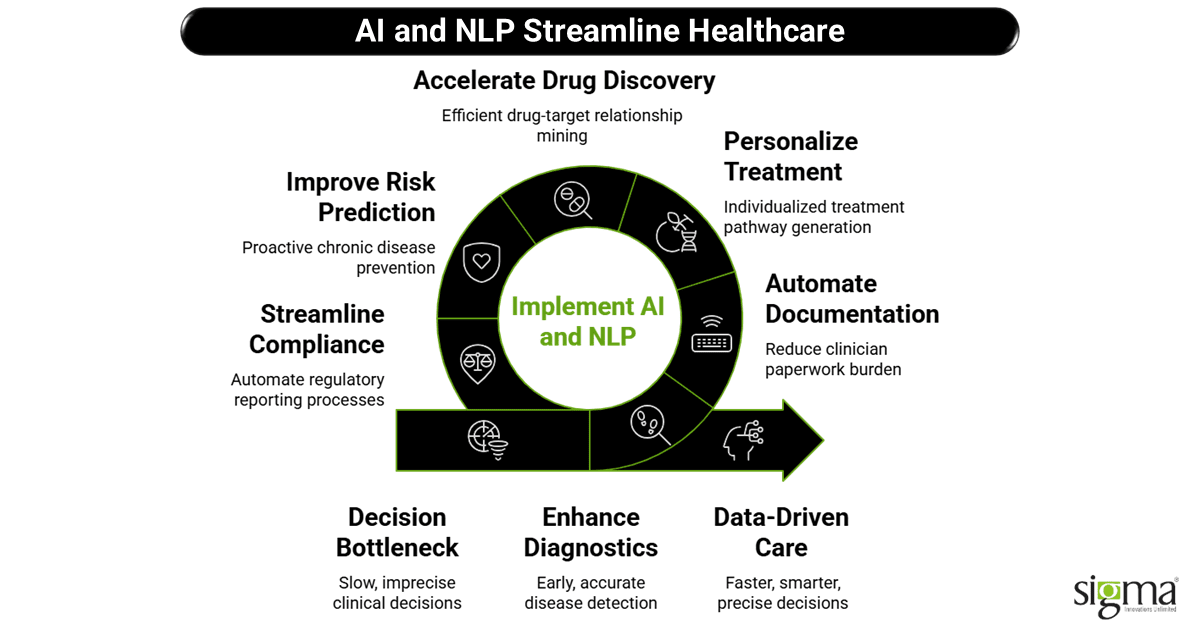
Enhancing Diagnostics & Early Detection
One of the most powerful applications of medical artificial intelligence is in diagnostics. AI-driven predictive models are being used in oncology, cardiology, and radiology to flag diseases earlier than traditional methods.
- In oncology, AI can scan pathology slides and detect cancerous cells with high accuracy.
- In cardiology, predictive models help identify patients at risk of heart failure before symptoms escalate.
- In radiology, NLP algorithms read through imaging reports to flag anomalies often missed in manual reviews.
Together, AI and NLP reduce diagnostic delays, giving doctors a head start in treatment planning and improving patient outcomes.
Clinical Documentation & Transcription
Ask any clinician, and they’ll tell you: documentation takes up too much time. With NLP-powered voice recognition, routine tasks like updating electronic health records (EHRs) can be automated.
- AI assistants act like digital scribes, listening to physician-patient interactions and instantly updating charts.
- This reduces errors caused by manual entry and frees doctors to spend more time with patients.
- Tools like ambient scribing are already showing measurable results in reducing burnout and boosting job satisfaction.
By removing the paperwork burden, NLP helps healthcare teams focus on what really matters i.e. patient care.
Personalized Treatment Recommendations
The future of healthcare is personalized medicine, and AI is making it possible today. Predictive models can analyze genomics, patient history, and real-world evidence to generate individualized treatment pathways.
Meanwhile, NLP scans thousands of clinical trial databases and medical literature to identify the most effective therapies for specific patient profiles.
A great example is oncology: doctors can now receive clinical AI insights that suggest tailored drug combinations or experimental therapies, ensuring patients receive treatments most likely to succeed.
Drug Discovery and Clinical Trials
Drug development is notorious for being expensive and time-consuming. Here, NLP in medicine plays a critical role by mining vast amounts of medical literature, research studies, and even social media for potential drug-target relationships.
- AI accelerates clinical trial recruitment by analyzing unstructured patient data, helping identify eligible candidates more efficiently.
- This not only speeds up the process but also reduces costs, a huge win for pharmaceutical companies and research institutions.
With AI & ML services in the USA, HealthTech companies are cutting years off the drug discovery cycle.
Risk Prediction & Preventive Care
Prevention is always better than cure, and healthcare analytics powered by AI are making this a reality. Predictive models can forecast hospital readmissions or flag early signs of chronic disease progression.
NLP adds another layer by extracting risk factors directly from physician notes and patient histories, helping healthcare providers take proactive steps. For example, if a patient’s chart notes frequent dizziness, the system can automatically suggest cardiovascular screening before the condition worsens.
Compliance & Regulatory Reporting
Staying compliant with ever-changing healthcare regulations is a challenge for providers. AI and NLP help automate these processes by:
- Automating clinical coding for insurance and billing.
- Generating regulatory documentation for FDA and HIPAA compliance.
- Detecting anomalies that can trigger audit readiness, reducing the risk of costly penalties.
By streamlining compliance, healthcare organizations save time and money while reducing administrative headaches.
Bottom Line: From diagnostics to compliance, AI and NLP are eliminating the “decision bottleneck” in healthcare. For HealthTech leaders, these applications aren’t just nice-to-have innovations, they’re essential building blocks for modern, data-driven care ecosystems.
Latest Trends Shaping AI + NLP Adoption in Healthcare
Healthcare is changing fast. These are some of the most important trends right now in how health technology, clinical decision support, medical artificial intelligence, and healthcare analytics are evolving; especially with AI & NLP in the USA and globally.
Key Trends
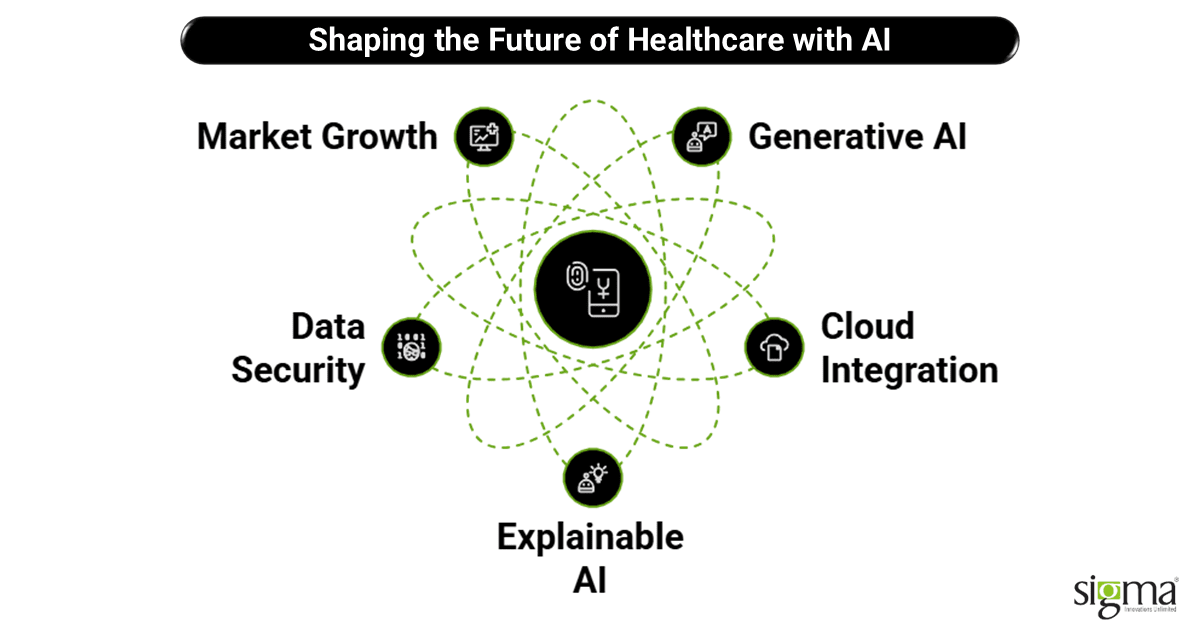
- Generative AI for Physicians & Patients: Tools like AI chatbots, virtual assistants, and large language models (LLMs) are becoming more common. They help with everything from patient triage to drafting clinician notes and answering patient queries.
- Integration with Cloud Platforms & Multimodal Models: To manage the scale and variety of healthcare data, more systems are using cloud computing. Also, models are moving beyond text alone to combine imaging, genomics, lab results, and structured data to enable more holistic insights.
- Explainable & Human-Centered AI: Clinicians want to trust the output. That means AI systems need to explain why they recommend something. Recent studies focus heavily on XAI (explainable AI) in healthcare; methods, taxonomy, and frameworks for interpretability.
- Data Security, Ethics, & Regulatory Compliance: With all the data flowing through systems, concerns about privacy (e.g. HIPAA in the USA), bias, transparent model behavior, and ethical use are more important than ever. This is shaping product design and adoption.
Market Growth & Statistics
- The global AI in healthcare market was valued at USD 29.01 billion in 2024 and is expected to grow to USD 39.25 billion in 2025, then to around USD 504.17 billion by 2032 with a very high CAGR (~44%).
- Another forecast puts the market at USD 110.61 billion by 2030, growing from about USD 14–15 billion in 2024, showing a CAGR of ~38−39 %.
- In the USA, the AI in healthcare market is projected to scale from around USD 11.6–12 billion in 2025 to nearly USD 195 billion by 2034, with an annual growth rate of ~37 %.
These trends confirm that AI in healthcare, NLP in medicine, and clinical AI are no longer niche ideas; they are becoming core to healthcare innovation. For HealthTech leaders, especially those in the USA, aligning strategy with these trends means staying competitive, improving outcomes, and reducing costs.
Also Read: Advancing Chatbot Capabilities with Full-Stack AI Development Services
Barriers & Challenges in Adoption
While AI in healthcare and NLP in medicine hold massive promise, the road to adoption isn’t without obstacles. HealthTech leaders face several barriers that can slow down or complicate deployment:
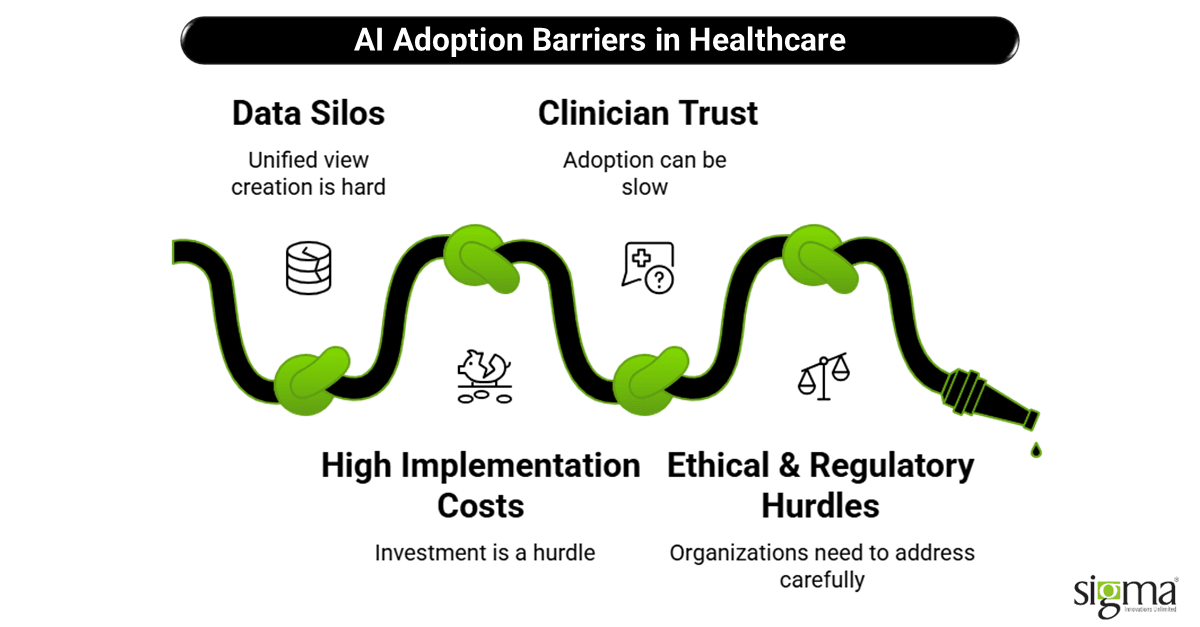
- Data Silos & Interoperability Issues: Healthcare data is often locked in fragmented EHR systems or incompatible formats, making it hard to create a unified view for clinical decision support.
- High Costs of Implementation: Deploying medical artificial intelligence solutions requires significant investments in infrastructure, integration, and training, which can be a hurdle for many healthcare providers.
- Clinician Trust & Explainability Concerns: Doctors want to know why an algorithm is suggesting a certain diagnosis or treatment. Without explainable AI, adoption can be slow.
- Ethical & Regulatory Hurdles: HIPAA compliance, patient privacy, algorithmic bias, and ethical use of patient data are all hot-button issues. HealthTech organizations need to address these carefully to avoid risks.
Despite these challenges, leading healthcare systems are showing the way forward:
- Cloud-based platforms are helping reduce costs and improve interoperability.
- Explainable AI frameworks are being integrated to build clinician trust.
- Stronger governance models are ensuring compliance while promoting innovation.
The message is clear: while challenges exist, they are not roadblocks. With the right partners and AI & ML services in the USA, healthcare organizations can overcome these barriers and accelerate their digital transformation journey.
Sigma Infosolutions’ POV: Building Smarter HealthTech Solutions
At Sigma, we believe that clinical decision-making shouldn’t be slowed down by fragmented systems or delayed insights. HealthTech leaders are under constant pressure to deliver better patient outcomes, cut costs, and remain compliant. That’s where Sigma steps in as a trusted technology partner.
Our expertise lies in building smarter, scalable solutions that make AI in healthcare real and actionable:
- AI/ML Model Development: We design and deploy advanced medical artificial intelligence models that turn raw healthcare data into predictive insights, supporting faster and more accurate clinical decisions.
- NLP for Unstructured Medical Data: With over 80% of healthcare data being unstructured, our NLP capabilities transform physician notes, transcriptions, and compliance records into meaningful, structured intelligence. This helps reduce documentation errors and improves real-time clinical decision support.
- BI & Analytics Dashboards: Through healthcare analytics and interactive dashboards, we empower leaders with clear, real-time visibility into patient outcomes, operational efficiency, and compliance metrics.
- Cloud + Salesforce Integrations: Our expertise in cloud solutions and Salesforce healthcare platforms ensures interoperability, data scalability, and compliance with regulations like HIPAA.
How We Help HealthTech Leaders
- Improve patient outcomes with precision-driven, AI-powered insights.
- Cut operational costs by automating documentation and streamlining workflows.
- Ensure compliance and security with AI systems built on strong governance models.
- Accelerate digital transformation by unifying data, people, and platforms into a smarter ecosystem.
In short, Sigma Infosolutions doesn’t just deliver technology, we deliver confidence in clinical AI adoption. By combining AI/ML, NLP, and analytics expertise, we help HealthTech leaders in the USA move from complexity to clarity, turning data into a strategic advantage.
Explore how we helped a leading US-based backup care solution provider to revitalize their technical infrastructure, making it more scalable, secure, and performance-driven!
The Future of AI and NLP in Clinical Decision-Making
The future of healthcare isn’t about replacing doctors with machines, it’s about empowering them with better tools. AI in healthcare and NLP in medicine are moving from decision support to full-fledged decision augmentation, where clinicians don’t just get recommendations but actionable insights they can trust.
Here’s where the future is headed:
- From Support to Augmentation: AI will move beyond assisting with diagnostics to actively suggesting treatment pathways, reducing uncertainty in high-stakes decisions.
- Multimodal AI: By combining text, imaging, genomic data, and lab results, clinical AI will deliver a 360-degree view of patients, helping clinicians detect risks earlier and design more precise care plans.
- Patient-Centered Ecosystems: AI-driven insights will enable truly personalized care, where patients get tailored recommendations, continuous monitoring, and better engagement in their health journey.
- Impact on Healthcare Economics: Smarter systems mean fewer diagnostic errors, reduced readmissions, and optimized resource use that can save billions in healthcare costs while improving patient outcomes.
- Clinician Well-Being: By automating repetitive tasks like documentation and compliance reporting, AI reduces burnout and allows physicians to spend more time with patients.
- Better Patient Experience: From faster diagnoses to personalized treatment, patients will feel the impact of AI not just in outcomes but in the quality of interactions with their care teams.
In this future, health technology powered by AI and NLP won’t just support care delivery, it will redefine heathcare industry overall.
Final Thoughts
AI and NLP are no longer optional add-ons in healthcare, they are critical enablers of smarter, faster, and more accurate clinical decision-making. From reducing diagnostic errors to improving patient outcomes, these technologies are already reshaping how care is delivered, measured, and experienced.
For HealthTech leaders, the message is clear: early adoption is essential. Those who embrace AI-powered insights, NLP-driven automation, and advanced analytics will not only stay competitive but also lead the transformation toward a patient-centered, efficient, and compliant healthcare ecosystem.
At Sigma Infosolutions, we bring proven expertise in Artificial Intelligence Development Services in the USA, helping HealthTech innovators harness the power of AI and NLP. Whether it’s building predictive models, unlocking value from unstructured medical data, or integrating cloud and analytics into existing platforms, we design solutions that are secure, scalable, and future-ready.
The future of healthcare is intelligent, connected, and patient-first. Partner with Sigma Infosolutions today to accelerate your digital transformation and shape the next generation of HealthTech innovation.



